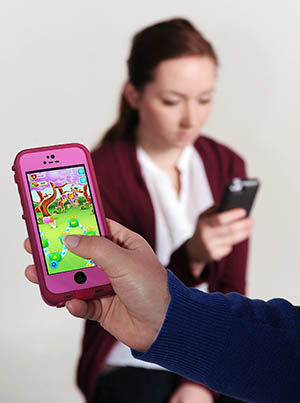Can cell phones define you? New study suggests ‘yes’

Cell phone use
Three Kent State professors and a graduate student questioned if excessive cell phone use during leisure time benefits college students in a November 2014 study.
Assistant professor Jian Li and associate professors Andrew Lepp and Jacob Barkley in the department of foundation, leadership and administration and graduate student Saba Salehi-Esfahani of the College of Education, Health and Human Services surveyed 454 undergraduate students on their cell phone usage during leisure activities.
Each student had to answer questions based on age, gender and personality, and daily use of his or her cell phone.
The researchers came to the conclusion that the more college students use their cell phones during free time, the more vulnerable they are to stress and anxiety.
Students who use their phones less are more productive in their free time.
“Low use extraverts prefer significantly more challenge during leisure. Challenge in leisure is related with personal growth and development and an accompanying deep sense of enjoyment,” according to the study found in the Computers in Human Behavior journal.
Not only does excessive use of phones make students less productive, it pulls them away from other activities and experiences.
In order for the researchers to compare students’ cell phone usage with their personalities, they sorted each personality into a category from “The Big 5.”
The Big 5 describes the basic dimensions of personality characteristics as extraversion, agreeableness, conscientiousness, emotional stability and openness.
The researchers then put the students into three main groups: low use extraverts, low use introverts and high use extraverts. The low use extraverts and introverts use their phones about three hours a day, while the high use extraverts use their phones ten hours a day.
These three groups were based off of how students use their phones daily and their types of personality. The results with high users were mainly extraverts, while the low users were both extraverts and introverts.
The results of this cell phone use study are comparative to results of another study done in 1990 about watching television. Both activities lack skill and thought.
Those who administered the test found that the low-use extraverts are less bored, take advantage of other activities available and are more open and emotionally stable. The low-use introverts seem to view their phone as their personality. The high-use extraverts tend to have lower GPAs and a higher level of stress than the other two groups.
The low-use extraverts also have most of the Big 5 characteristics, scoring the highest in extraversion, openness and emotional stability. The low-use introverts scored the lowest of those three characteristics.
According to the study, 88 percent of students claim to use their cell phones for entertainment purposes rather than educational or informative purposes. This is mainly because cell phones have more accessibility to social media, such as Facebook, Twitter, Instagram, Snapchat and more. Now that cell phones have the capability to play video games, television shows or movies, it’s not hard to resort to it during down time.
In the recent press release, professor Lepp suggests there are more creative ways to fill in free time.
“The high-frequency cell phone user may not have the leisure skills necessary to creatively fill their free time with intrinsically rewarding activities,” Lepp said in the press release.
The results of this study prompted various reactions from current Kent State students.
Sophomore public relations major Kate Schwanke said that sometimes her phone could be a distraction when it comes to leisure time.
“When it comes to school work, it can be a distraction,” Schwanke said. “But I try my best to put my phone on silent and put it away while I’m studying. I think it can also make me push things off sometimes because it can definitely be a distraction.”
While some students say that their phones can be a distraction, freshman journalism major Leisel Kober said she is able to get work done before using her phone in her free time.
“I watch Netflix or sit on Pinterest searching for basically nothing,” Kober said. “I also like to hang out with friends and talk about what we’ve done in our busy time and new things.”
Similar to the results of the study, Kober uses her phone for entertainment purposes, rather than informational purposes, but not all students find the endless activities to be so distracting or entertaining.
Juliana Houck, freshman visual communication design major, spends her time a little differently. While some of her time is spent on social media, a good chunk of her time is spent doing other activities.
“Whenever I’m with friends, we normally go walk around stores and malls (and when it’s not freezing, walking around in the city or finding hiking trails in the suburbs) or hang out in restaurants,” Houck said, “Other than that, probably just exercising, especially running.”
For more information, the study is published online on the Computers in Human Behavior journal.
Contact Lydia Taylor at [email protected].


